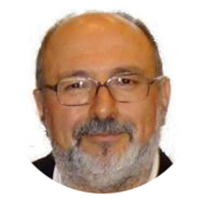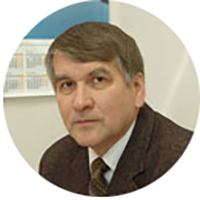Laboratory of Algorithms and Technologies for Networks Analysis
Laboratory of Algorithms and Technologies for Networks Analysis (LATNA) was created in 2011 at HSE Nizhny Novgorod. It secured research grants to extend its work beyond the initial three year project – among other funding it received a grant from the Russian Science Foundation for working on the project “Clustering and Search Technique in Large Scale Networks”. The HSE Lookis glad to continue the talk with LATNA from the April issue in which Panos Pardalos, laboratory’s Scientific Advisor shared his impressions from the XVI April International Academic Conference on Economics and Social Development and told about the laboratory’s workshop on data analysis methods.
What is the focus of the laboratory’s research and its applications?

Panos Pardalos, University of Florida, Distinguished Professor of Industrial and Systems Engineering, Scientific Advisor of the Laboratory of Algorithms and Technologies for Networks Analysis at HSE Nizhny Novgorod
Our laboratory focuses on how to analyze large data sets and networks. Everybody collects data these days but many do not know what to do with it – it’s like having a lot of books but not knowing how to read them. A lot of data is “noisy” and has errors, and cleaning data is one of the big challenges. We also work on many mathematical problems behind the techniques of analyzing data. For instance, we work on such famous combinatorial discrete problems as the maximum clique and graph theory - they have a lot of applications, especially in social networks. Two years ago I was a co-editor of a two-volume Handbook of Optimization in Complex Networks, and one volume is devoted to social networks, and another – to theoretical aspects.
Networks are applicable to all branches of science. They appear in biological research (biological networks, protein interaction) and computational neuroscience (brains are made up of the neurons and the dynamic connections between them). Social networks – like Facebook – are useful for studying how the news move around, how people share the information. At the laboratory we are also very interested in how different networks cooperate with each other and converge.

Valeriy Kalyagin, HSE Tenured Professor, Head of the Laboratory of Algorithms and Technologies for Networks Analysis
We also work with specific companies: for example, we use network analysis to help address the routing and logistics issues, or we work with analyzing large datasets, which is useful for IT companies.
The laboratory is situated in Nizhny Novgorod HSE branch but it also has good connections within other campuses of HSE: for example, this spring I gave a talk at the colloquium of the Faculty of Computer Science and one of our lab researchers and PhD students, Alexander Ponomarenko, was awarded the Ilya Segalovich scholarship from Yandex. We also plan a joint summer school with colleagues from St. Petersburg branch of HSE.
Panos Pardalos: Speaking of cooperation outside HSE, last year we organized two conferences: with the Institute of Information Transmission Problems of the Russian Academy of Science (RAS) and with Energy System Institute of the Siberian branch of the RAS.
Does the lab engage students into research?
Panos Pardalos: We have a lot of young people involved – PhD students, Master students, undergraduate students. We hope to attract more young people to the laboratory through the summer school: it provides the right environment for intensive learning and for engaging students in the research. Young researchers get a chance to receive good feedback from professors and other students.
When we just started the laboratory five years ago, we were teaching the students how to present the research results, and I can see how they’ve grown – they are confident, they go to international conferences. We see this as a success of the laboratory: young people really engaged into research and learned how to participate in the academic events.
The full text of the June issue of The HSE Look can be found here. For further information please visit ifaculty.hse.ru
See also:
Mathematicians and Practicing Surgeons to Fight Venous Diseases
One million people in Russia suffer from venous diseases. The ‘Intelligent data analysis for healthcare information systems’ Mirror Lab project brings together expertise in mathematics and medicine in order to better diagnose various conditions in phlebology. Project leader Vasilii Gromov talked to The HSE LooK about its achievements and prospects.
An Economics and Engineering Approach to Energy Supply Development in Remote Areas of Russia
Ilya Dolmatov, Director of the HSE Institute of Economics and Utility Regulation, heads a Mirror Lab project titled ‘Models of Energy Infrastructure Development in Russia’s Remote and Isolated Territories’ and implemented together with a university in Irkutsk. Why is energy efficiency a particularly pressing problem in remote territories? How can economics and engineering work together to solve it? Ilya Dolmatov addressed these and other issues in his interview for The HSE LooK.
Two Russian Regions Cooperate in Migration Studies as Part of Mirror Labs Project
What does Kaliningrad Oblast, an exclave Russian territory, have in common with Perm Krai, a region in the Urals? How do researchers use digital humanities methods to study migration? Sergei Kornienko, Leading Research Fellow at the Group for Historical Research (HSE University-Perm), heads the Mirror Lab project ‘Migration as a factor of social transformation of Soviet regions during the post-war reconstruction period: an analysis through digital humanities’. In this interview for The HSE LooK, he talks about this collaboration.
HSE University Collaborates with University in Southern Russia to Compare Values and Identities across Generations and Regions
Is there a system of values that is common to the whole population of Russia? Do values differ across generations? Is it possible to carry out research among refugees? HSE University researchers joined forces with their peers from Kuban State Technological University to study values and intercultural relations across Russian regions as part of a Mirror Labs project. The HSE LooK talked about this cooperation to Nadezhda Lebedeva, Director of the HSE Centre for Sociocultural Research, who heads up the Mirror Lab project, and project participant Victoria Galyapina, Leading Research Fellow at the same Centre.
Harnessing Synergy
Through its Mirror Laboratories project, HSE University develops collaborations with academic institutions across the country. Today, it includes 22 ongoing projects in partnership with 20 universities in mathematics, computer science, economics, sociology, biology, history and many other fields. Marina Litvintseva, Director for Advanced Research at HSE University, coordinates international and mirror laboratory projects. In this year’s second issue of HSE LooK, she talked about the development of mirror laboratories and the future of the project.
IT at HSE Perm: From Academic Projects to Commercial Research
Aleksey Kychkin, Head of the Laboratory of Interdisciplinary Empirical Studies, spoke to the HSE Look about his background, industry projects the lab has been doing, and student involvement in research.
‘Our Strength Is in Our Interdisciplinarity, Both Methodologically and Practically’
What are the necessary digital competencies for students of humanities? Where can they apply their knowledge and skills? What projects in digital humanities are currently underway at HSE University Perm? Dinara Gagarina, HSE University-Perm scholar and the national representative of Digital Humanities Course Registry, answers these and other questions in her interview with the HSE Look.
HSE University in Perm: ‘We Help Talents Develop in the Region’
Galina E. Volodina has been the Campus Director in Perm since 1997. Under her leadership, the Perm campus has turned into the major player in shaping the region’s future—be it general education, retaining of talents, or R&D. In her interview for the HSE Look, Galina Volodina shares how HSE Perm’s development agenda has been altered and what are its current priorities.
‘Our Distinction Is Our Core Areas of Research’
In his interview for the HSE LooK, Evgenii A. Krouk, the Acting Director of HSE Tikhonov Moscow Institute of Electronics and Mathematics, talks about the distinctive features that set the institute apart, the place of project-based learning on the curriculum, research areas with the highest potential, and his vision for HSE MIEM future development.
Breaking Records Every Day
Tiago Teixeira Saraiva, Research Fellow at the Quantum Nanoelectronics Laboratory, has talked to the HSE LooK about joining HSE University back in 2019, making breakthroughs in superconductivity research, and working with Russian students. He also shares what makes Moscow particularly attractive for him and gives a useful tip to future postdoc fellows at HSE University.


